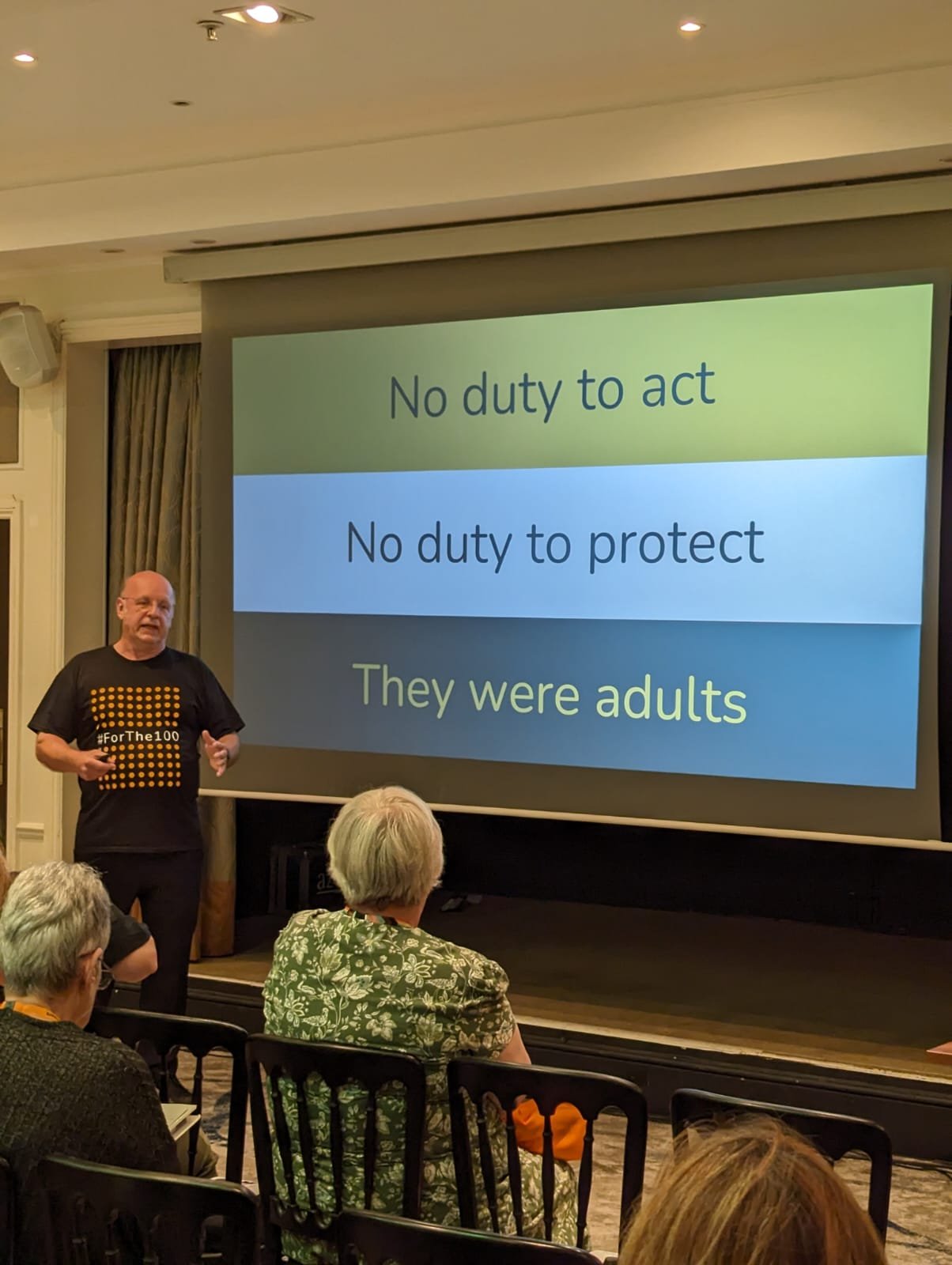Employers have it. Hospitals have it. Schools have it. Prisons have it. Universities do not. And it’s costing approximately 100 student lives a year. Our mission is to get universities to have a recognised legal duty of care towards their students.
Our Mission: To Make Universities Have a Legal Duty of Care
“They'd rather phone you, to tell you your child is dead, than actually phone you beforehand. This is the crazy situation that we’re in, they’d actually let someone die.”
— Bob Abrahart, Founding Member of ForThe100
FAQ’s:
Duty of care is a legal concept that is widely misunderstood. It’s important to know what it is not. ForThe100 is not campaigning for universities to have a responsibility to prevent suicide or be accountable for it. We are certainly not suggesting that universities should be healthcare providers responsible for solving the mental health crisis.
We want a recognised legal duty of care, requiring universities to act responsibly and provide education with reasonable care and skill. We propose that a duty of care functions in universities as it does in the professional world.
“Our goal is parity with the workforce because it’s a nice straightforward equivalent. It means you say hello to your workers, you consider them, you don’t overload them if you know something is wrong.” — Bob
What does a duty of care actually mean in this context?
How are we working to achieve this?
There are two ways to achieve a legal duty of care.
Through the courts
A general common law duty of care is owed by every person to every other person. This duty applies when an individual or group engages in an activity that could foreseeably cause harm to another person, for example by requiring students to participate in potentially dangerous educational activities - whether that harm is physical, mental, or economic/financial. In other words, there is a recognised responsibility to avoid taking actions that could reasonably result in harm to others.
But there is no established common law equivalent for universities to prevent harm from occurring to students in situations where staff could do something to help but don't - acts of omission - such as protecting students from being harassed by other students, phoning for an ambulance after a student has been injured, or failing to shout a warning in dangerous situations.
These additional responsibilities would require a legally recognised ‘special relationship’. However, for universities to owe such an obligation to their students, that legal duty of care relationship must be established through case law (i.e. a judge on a case finds that universities had a specific duty of care in said circumstances).
It seems they are reluctant to do so. Bob and Maggie attempted to sue Bristol under common law duty of care for Natasha’s distress and suffering, but the County Court judge found no precedent [although he could have set one] and the High Court judge refrained from imposing any such duty on the higher education sector. His reasoning: “The issue is one of potentially wide application and significance.” This is exactly the point.
UK courts have now recognised one common law duty of care owed by a university, but that judgement was highly specific to the case in point. Unfortunately, this is how common law functions.
This case was Sydney Feder and Alyse McCamish versus the Royal Welsh College of Music and Drama. The judge ruled that universities do have a duty of care to students to reasonably investigate allegations of sexual assault.
Bob explains; “it would take dozens of cases to cover all aspects of an overarching university owed duty of care if each case was this specific.”
2. Through Parliament
The other way, then, to establish a clear-cut legal duty of care on the part of universities is to petition the Government to make it law through statutory legislation. This is ForThe100’s mission. Our petition in 2023 made it to Parliament and, despite having broad cross-party support, was stonewalled by the Minister for Higher Education.
We have not given up.
“Our mission is to keep it on the agenda until things change and students are protected.” — Maggie
We are going to the Government, directly, because we believe that greater accountability will lead to better decision making and improved student outcomes.
In Bob’s words: “There's no way you can actually get redress against a negligent university because they are giant business corporations, just like the Post Office.” The university complaints procedure is long and bureaucratic, putting many people off, and the Office of the Independent Adjudicator for Higher Education doesn't deal with complaints arising after someone has died.
“It simply becomes a war of attrition in which everything is stacked against you. So we’re about galvanising public opinion, shouting from the rooftops, and enabling loads of people to have their voices heard rather than sitting down with the sector and haggling for handouts.” — Bob




“Nobody's trained in what they should do in those instances. So nobody calls nine, nine, nine, nobody calls an ambulance, nobody calls home.”
— Esther
How having a duty of care would make a difference:
Maxine and Esther’s sons, called Oskar and Theo respectively, had previously attempted suicide before they died. In both instances, the university was aware of this but did not inform their parents, despite both boys having ticked boxes consenting for their parents to be contacted in case of emergencies.
In Oskar’s case, Sheffield Hallam University responded to Maxine’s question about why they did not contact her with the argument that a suicide attempt did not come under ‘emergencies’. Only things like ‘floods and broken legs’ did.
Theo’s flatmates called the university halls’ security services when he was in a desperate way but Esther explains that “Nobody's trained in what they should do in those instances. So nobody calls nine, nine, nine, nobody calls an ambulance, nobody calls home.”
He died that night. “Duty of care would’ve saved him that day."
In Natasha’s case, the University of Bristol knew about her social anxiety disorder but still required her to do oral assessments they knew she was not capable of doing. She died by suicide on the day she had been scheduled to participate in a major group presentation.
As explained by the judge in his County Court judgement: “There can be no doubt that the University would have been in breach [had a duty of care existed]; the main breach would be continuing to require Natasha to give interviews and attend the conference and marking her down if she did not participate when it knew that Natasha was unable to participate for mental health reasons beyond her control.”
Why don’t universities want to have a statutory legal duty of care to their students?
Universities’ stalling is likely out of fear that they would be widely sued for negligence relating to breaches of a statutory duty of care if it necessitated a legal standard of professional behaviour. But Bob explains that this would not necessarily be the case: “We know the courts will weed out claims that lack merit. And the cost of taking a university to court, I can tell you, is astronomical. Who the hell is going to risk that? Only the worst cases would go to court surely, for events that should have been preventable.”
Our mission is not to villainise universities or put unrealistic expectations on their staff. It is to legally set out what staff should do in difficult situations, empowering them to use common sense and individual judgement, and to do something instead of nothing. ‘Should I phone someone? Should I notify well-being?’ They would know what to do automatically.
“What you expect to happen when there's a tragedy is for universities to want to inspect themselves to see whether there's anything they could reasonably do that could have prevented something. What actually happens is denial, denial, denial. And they don't want to have a duty of care in case they get something wrong and might be held to account. But my thoughts are that if they get it wrong, then they need to know so they can make the changes.” — Maggie
Our Mission: More Than a Suicide Prevention Charity
Our reason for wanting a statutory duty of care is not just about suicide prevention, since a duty to act reasonably and responsibly would also help in many other situations in which students might be wronged or harmed.
“It's much broader - ranging from a responsibility to protect individuals from sexual misconduct, to ensuring that their financial well-being is safeguarded against any harm or negligence that might cause them to lose money." — Bob
Universities are causing unnecessary suffering with real consequences, and needlessly losing good, bright young people. That's why we are campaigning for a legal duty of care.
“Suicides are just the tip of the iceberg…Students are [also] leaving university because of failings there. At the end of Natasha’s trial the judge awarded damages; this was not for her death but for the pain and suffering she experienced before she died.” — Maggie
Final note: To people approaching us asking for support or advice for inquests, or because they are suicidal themselves; unfortunately we are not the best people to talk to about such concerns, although we will always respond and help as much we can.
